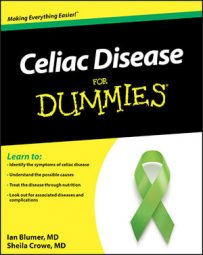Although you may not have any of the symptoms of celiac disease, you may still have the condition and be endangering your health through the consumption of gluten. Some people without symptoms of celiac disease should consider being screened for the ailment, which usually involves blood tests and always involves taking a biopsy if the blood test is positive.
Your doctor and you should discuss testing you for celiac disease if you have any of the following:
A first degree relative (that is, a parent, sibling, or child) with celiac disease.
Another disease that often occurs together with celiac disease and therefore puts you at increased risk of having celiac disease. An example is Type 1 diabetes.
A health problem that can be caused by celiac disease. Examples are osteoporosis and iron deficiency.

